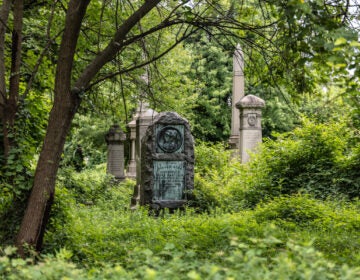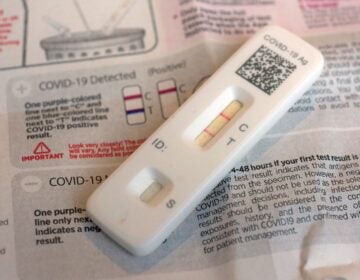Revamped Germantown Special Services District scheduled to launch July 1
Last year, city Planning Commission staffers spent months conducting a study of the Chelten Avenue corridor, part of an effort to bring back shoppers and a better mix of businesses to the commercial district off Germantown Avenue.
There were roundtable meetings and surveys, wish lists and impassioned discussions with neighbors and business owners.
People talked about trash and property values, trash and crime, trash and a desire for more cafes and fewer fast-food stores, trash and the need for better lighting at public transit stops.
And trash.
Nearly everyone mentioned trash.
Emerging from the trash heap
What resulted was the Central Germantown Business District Beautification Plan (PDF), which took stock of the business offerings, documented problems such as nearly 22 percent vacancy in the retail district, and made 25 recommendations for everything from streetscape improvements to future zoning approaches.
When all was said and done, the only questions left were how to implement the recommendations and how to pay for it all.
The ongoing re-invigoration of the Germantown Special Services District, a business improvement group, is a major step in that process.
Fees within the zone
It includes a move to reinstate assessments — an additional mandatory fee levied on commercial properties within the district’s boundaries — to fund at least some of the needed improvements.
In the first year, that will equal about 12 percent of the property’s tax bill.
“Everybody knows that there’s a trash situation,” said Marcus Heppinstall, a business owner in Maplewood Mall for decades who is now a key member of the new GSSD’s initial steering committee. “We need trash pickup, we need trash cans out there. We have lots of ideas here, but none will work without trash and security.”
At last year’s meetings on the previous Chelten Avenue plan, Heppinstall was a visible, vocal presence — at one point complaining about an abandoned SUV that had been left parked on Maplewood Mall so long the parking ticket stuck to its windshield was fading from exposure to sun and rain.
In recent weeks, he has spent days going door-to-door talking to business owners about the GSSD and soliciting their support.
Special-services history
Germantown has had a Special Services District since 1995, which is authorized as a municipal authority through 2025, though it went dormant in 2011 when former Eighth District Councilwoman Donna Reed Miller left office.
The new version of GSSD, spearheaded by current Councilwoman Cindy Bass’ office and targeted for a July 1 launch, would have a new group of board members, a new direction and, eventually, a new director and staff.
Under the draft plan released last week, the district would focus on commercial properties fronting on Germantown Avenue between Coulter and High streets, Chelten between Baynton and Morris, along with Maplewood Mall, Market Square and sections of Greene Street and Wayne, Pulaski and Maplewood avenues.
An initial draft budget proposal anticipated billing $178,176 in assessments, and expenses including $78,913 for cleaning and maintenance, $50,000 for salary and benefits to a yet-to-be-hired district manager, and nearly $3,000 for communications and marketing.
A final draft plan and budget are expected to be sent to Bass’s office and the city Commerce Department for final review in early March, followed by a public hearing with property owners.
After another formal public hearing and an a 45-day objection period, it would be sent to City Council for approval. (See the entire draft plan here.)
Dissention lingers
Even among those who believe the business district needs help desperately, not everyone is completely on board.
At a meeting last week to unveil and discuss a draft version of a plan for new GSSD services and budget, several business owners were skeptical of the district’s potential effectiveness.
To some, the involvement of the council office — necessary for the the district to be re-authorized — is cause for concern. The council office does not run the business improvement district, but approves board members.
Seymour “Sy” Hoffman, property manager for 101 W. Chelten Ave., said he agrees the business district needs help but “only if it’s done non-political. First, we get to deal with the revaluation and now, they want another 12 percent on top of this.”
At the same time, Hoffman — who arrived at Thursday night’s meeting with a list of 14 different items of concern — worried that the GSSD’s initial plans to hire one full-time and two part-time workers to clean streets within the district during the week weren’t enough.
Cornelia Swinson, executive director of Germantown Restoration CDC and a board member of the historic Johnson House, said the steering committee sought input and advice from some of the city’s 12 other active business improvement districts, including those in Mt. Airy, Roxborough and Aramingo.
“We learned that it doesn’t always take as many people as you think,” Swinson said. “It takes the right people, doing the right things. We learned that what we were thinking as a budget really is enough to make a difference.”
Unfair burden
Jim Foster, publisher of the Germantown Newspapers and one of the neighborhood’s most vocal watchdogs, said the large number of non-profit — and therefore non-taxed and non-assessable properties — in the neighborhood created an unfair burden on tax-paying businesses.
“Everyone should pay, for-profit or non-profit,” Foster said, saying the “suggested donations” often sought from non-profits within business improvement districts wouldn’t be enough. “This creates an undue burden on those who aren’t nonprofits. The ratio is too high here.”
Denis Murphy, manager of business improvement districts for the city Commerce Department, said state law limits the ability to force non-profits to pay.
He also pointed out that properties owned by nonprofits, but not used solely for charitable purposes like the building where Imani Charter School is located, would be assessed because it has retail on the first floor.
Of the total 297 properties within the GSSD boundaries, 237 would be subject to GSSD assessment, Murphy said.
Among the others are 47 tax-exempt churches, schools, and buildings owned by the city or SEPTA, and 13 that are single-family properties used solely for residential purposes.
NewsWorks has partnered with independent news gatherer PlanPhilly to provide regular, in-depth, timely coverage of planning, zoning and development news. Contact Amy Z. Quinn at azquinn@planphilly.com.
WHYY is your source for fact-based, in-depth journalism and information. As a nonprofit organization, we rely on financial support from readers like you. Please give today.




